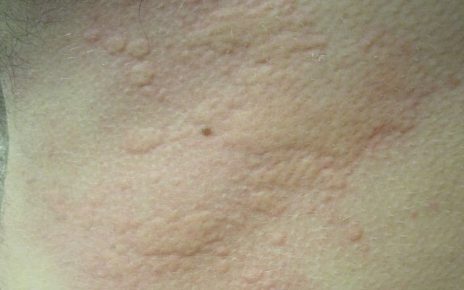Millennials are more sceptical of vaccines because they haven’t been ‘exposed to the reality of a number of diseases’
- Those aged 18-24 are 24% less likely to think vaccines are safe than the over-65s
- People between 25 and 34 are 39% less likely to be convinced of jabs’ safety
- Older people see vaccines as the norm and are less influenced by social media
- Forums make extreme views on vaccinations seem more widely held
- European countries are shunning jabs despite a measles outbreak
View
comments
Millennials are more likely to be sceptical about the importance of vaccines than their parents or grandparents, research suggests.
Those aged between 18 and 24 are a quarter less likely than the over-65s to believe vaccines are safe, according to a report.
Scientists warned this could be because they haven’t been exposed to ‘the reality of a number of diseases’.
Disgraced gastroenterologist Andrew Wakefield sparked fears of vaccines with his 1995 theory that the measles, mumps and rubella vaccine is linked to bowel disease and autism.
His controversial views have since been widely discredited and Wakefield has been struck off.


Disgraced gastroenterologist Andrew Wakefield, who is believed to be dating the supermodel Elle Macpherson (both pictured), sparked fears of vaccines with his discredited 1995 theory that the measles, mumps and rubella vaccine is linked to bowel disease and autism
The London School of Hygiene and Tropical Medicine report also found those aged 25-to-34 are 39 per cent less convinced by jabs’ safety.
Professor Heidi Larson, lead author, believes older people see vaccinations as the norm.
‘You did it because it was what you did for the health of your child — everybody else did it, it was felt to be important for the family and community,’ she said.
‘People at a younger age have been less exposed to the reality of a number of diseases.
‘Personally, I think that experience of seeing how serious some of them can be does influence your decision.’
The over-65s are also less influenced by social-media forums that shun jabs, Professor Larson added.
-
 Millions of women are at risk of cervical cancer by missing…
Millions of women are at risk of cervical cancer by missing…  UK has the highest sepsis death rates for women – topping…
UK has the highest sepsis death rates for women – topping…  Newborn baby dies and another falls ill ‘after catching…
Newborn baby dies and another falls ill ‘after catching…  Struggling to get out of bed in the morning could be down to…
Struggling to get out of bed in the morning could be down to…
Share this article
Views posted on social media can appear to be more widely held than they actually are, no matter how extreme they may be, she believes.
The report also found many European countries are shunning vaccinations despite a measles outbreak spreading across the continent.
People who live in Finland, Sweden, the Czech Republic and particularly Poland are less likely to think of jabs as safe than they did in a 2016, according to another report by the same researchers.
Eastern Europe has been badly hit by a measles outbreak, with 41,000 cases in the first six months of 2018 and at least 37 deaths, The Times reported.
There were just 23,927 incidences in 2017.
WHO IS MOST AT RISK OF MEASLES?
Everyone has at slight risk of developing measles as being vaccinated does not guarantee full immunity.
Unvaccinated young children are particularly at risk, as well as pregnant women who have not had the jab.
Measles is common in many developing countries, particularly parts of Africa and Asia.
More than 95 per cent of measles deaths occur in countries with low average incomes.
Outbreaks can be particularly life-threatening in countries experiencing or recovering from natural diasters or conflict.
Damage to health services disrupts routine immunisation, while overcrowding greatly increases the risk of infection.
Source: World Health Organization
Although the report found those who live in the UK generally have higher confidence in vaccines than elsewhere in Europe, the number of British children getting the MMR has fallen for the fourth consecutive year.
Some 828 measles cases were confirmed in England up to August 13, compared to 274 throughout 2017.
To prevent a measles outbreak, it is recommended that 95 per cent of the population is immunised against the infection.
Only 91.9 per cent of children were vaccinated against measles between 2015 and 2016 compared to 94.2 per cent in 2014/2015 and 94.3 per cent in 2013/2014, according to NHS immunisation statistics.
‘Vaccine confidence is dynamic and volatile and must be watched closely, especially given the public health risks of vaccine hesitancy and refusal,’ Professor Larson said.
‘Interestingly, across the EU, there is less confidence in the flu vaccine than in the MMR vaccine, perhaps in part due to the efficacy of the flu vaccine changing year to year, but also because there is a low perception of the various serious risks of influenza.
‘Another trend of note is that while there is an overall confidence among GPs to recommend the influenza vaccine, there is considerably more hesitancy around recommending the vaccine to pregnant women.
‘This is worrying as the group is considered very high risk for serious complications when it comes to flu.
‘Hopefully this report will be a catalyst for countries to pay attention to and monitor their own levels of vaccine confidence – change won’t happen overnight… but it is possible.’


Those aged 18-to-24 are 24 per cent less likely to believe vaccines are safe (stock)
This comes after Wakefield published a study more than 20 years ago in The Lancet, suggesting children who had been vaccinated against MMR were more likely to have bowel disease and autism.
He speculated that being injected with a ‘dead’ form of the measles virus causes disruption to intestinal tissue, leading to both of the disorders.
After a 1998 paper further ‘confirmed’ this finding, Wakefield said: ‘The risk of this particular syndrome [which he termed autistic enterocolitis] developing is related to the combined vaccine, the MMR, rather than the single vaccines.’
At the time, Wakefield had a patent for single MMR vaccines and was therefore accused of having a conflict of interest.
Nonetheless, MMR vaccination rates in the US and UK plummeted.
But in 2004 the then-editor of The Lancet Dr Richard Horton described Wakefield’s research as ‘fundamentally flawed’, adding he was paid by attorneys seeking lawsuits against vaccine manufacturers.
The Lancet formally retracted Wakefield’s research paper in 2010.
Three months later, the General Medical Council banned Wakefield from practicing medicine in Britain, stating his research had shown a ‘callous disregard’ for children’s health.
On January 6 2011, The British Medical Journal published a report showing that of the 12 children included in Wakefield’s 1995 study, at most two had autistic symptoms post vaccination, rather than the eight he claimed.
At least two of the children also had developmental delays before they were vaccinated, yet Wakefield’s paper claimed they were all ‘previously normal’.
Further findings revealed none of the children had autism, non-specific colitis or symptoms within days of receiving the MMR vaccine, yet the study claimed six of the participants suffered all three.
IS ANDREW WAKEFIELD’S DISCREDITED AUTISM RESEARCH TO BLAME FOR LOW MEASLES VACCINATION RATES?


Andrew Wakefield’s discredited autism research has long been blamed for a drop in measles vaccination rates
In 1995, gastroenterologist Andrew Wakefield published a study in The Lancet showing children who had been vaccinated against MMR were more likely to have bowel disease and autism.
He speculated that being injected with a ‘dead’ form of the measles virus via vaccination causes disruption to intestinal tissue, leading to both of the disorders.
After a 1998 paper further confirmed this finding, Wakefield said: ‘The risk of this particular syndrome [what Wakefield termed ‘autistic enterocolitis’] developing is related to the combined vaccine, the MMR, rather than the single vaccines.’
At the time, Wakefield had a patent for single measles, mumps and rubella vaccines, and was therefore accused of having a conflict of interest.
Nonetheless, MMR vaccination rates in the US and the UK plummeted, until, in 2004 the then-editor of The Lancet Dr Richard Horton described Wakefield’s research as ‘fundamentally flawed’, adding he was paid by attorneys seeking lawsuits against vaccine manufacturers.
The Lancet formally retracted Wakefield’s research paper in 2010.
Three months later, the General Medical Council banned Wakefield from practicing medicine in Britain, stating his research had shown a ‘callous disregard’ for children’s health.
On January 6 2011, The British Medical Journal published a report showing that of the 12 children included in Wakefield’s 1995 study, at most two had autistic symptoms post vaccination, rather than the eight he claimed.
At least two of the children also had developmental delays before they were vaccinated, yet Wakefield’s paper claimed they were all ‘previously normal’.
Further findings revealed none of the children had autism, non-specific colitis or symptoms within days of receiving the MMR vaccine, yet the study claimed six of the participants suffered all three.
Source: Read Full Article



